This one from ABC News especially caught my eye. The article itself isn't anything earth-shattering, but I was impressed by the link to the National Network for Immunization Information on the bottom of the article (above the TACA link, and in bold no less). Kudos to ABC for being balanced on this. What really struck me, was the video of Jim and Jenny's interview from Good Morning America. This particular part, when Diane Sawyer is narrating how Jenny's son "recovered" from autism:"but doctors now say he was likely never autistic to begin with. Undaunted she remains an advocate fighting for Evan and other children..."
I wonder--is it doctors that ABC consulted with for the story, or physicians who are familiar (as in face to face) with Jenny's son? I think we are owed clarification on this. This idea, of children being wrongly diagnosed with autism is something I've visited before in the comments at Autism Vox here (and my other statement). I think there are children who have dietary sensitivities and allergies, who have some autistic-like (or ADHD-like) symptoms. Perhaps they get prematurely diagnosed, when really the issue is something else. Now, I will say this, in an environment of acceptance and love, a premature diagnosis doesn't necessarily do any harm to the child. I don't think there is any child who would not benefit from, say, speech or occupational therapy, etc. Harm can occur, however, when parents (and Jenny is not alone on this one, far from it) claim that this diet or this treatment "recovered" or "cured" their child.
As in the case of Jenny's son, he apparently had significant changes when the GFCF diet was started. Perhaps his issue was sensitivities to foods and gastrointestinal problems. My daughter has had her fair share of G.I. issues. We have managed them rather well, our physicians are incredible. Had we not been on the ball with her tummy troubles, or had our doctors made wrong diagnoses, I imagine our child would be in tremendous pain much of the time. Luckily, most of her issues were addressed before she was two. For a child who cannot verbalize at all, or only limited, how does that pain get expressed? Through screaming, self-injury, etc. If a child has a speech delay plus gastrointestinal issues, this could very well look like autism.
But let's make one thing clear: having autism and having something "else," are two very separate things. There are children who may exhibit autistic-like symptoms or signs, as well as signs of ADHD, etc. when really there is a food intolerance or other sensitivity. For those children, diet alterations will make all the difference. For a child with autism, you cannot assume that dietary changes will add up to speech or any other drastic changes, let alone "recovery." I've yet to meet one parent in real life who has said "we started the GFCF diet, and weeks later my child was doing X." I have heard some parents say they think they've seen some small positive changes, and in one case, a mother felt her child's sensory issues were "a little better." I'm not bashing the GFCF diet. I've known several people with Celiac Disease who are thriving due to it. I think it has its place. I also feel that if your child and your family can stick to such a diet, and if some positive comes from it, then go for it. Strangely enough, a lot of our foods are gluten-free (we shop at Whole Foods and such, these cookies are awesome!). However, it so happens that my youngest will not consume any of those foods (she eats about 5 different foods regularly, that's it). A few of the parents from my daughter's school also say they too are unable to follow the diet. Their child, like mine, may eat only one fast-food brand of chicken nugget, or a specific brand of frozen pizza, etc. Some of us have worked for years to get our child to eat anything resembling a meal. For us, if you simply present a new food on our daughter's plate, it will send her into a rage. She barely eats as it is. So, if anyone can realistically offer how to switch her to GFCF, be my guest. But, for some, if not many, of us, this diet is not feasible. And so I beg of you, do not point your finger saying we are failing our children by not following the diet--or any other "treatment." As the saying goes, walk a mile in my shoes...
I'm not bashing the GFCF diet. I've known several people with Celiac Disease who are thriving due to it. I think it has its place. I also feel that if your child and your family can stick to such a diet, and if some positive comes from it, then go for it. Strangely enough, a lot of our foods are gluten-free (we shop at Whole Foods and such, these cookies are awesome!). However, it so happens that my youngest will not consume any of those foods (she eats about 5 different foods regularly, that's it). A few of the parents from my daughter's school also say they too are unable to follow the diet. Their child, like mine, may eat only one fast-food brand of chicken nugget, or a specific brand of frozen pizza, etc. Some of us have worked for years to get our child to eat anything resembling a meal. For us, if you simply present a new food on our daughter's plate, it will send her into a rage. She barely eats as it is. So, if anyone can realistically offer how to switch her to GFCF, be my guest. But, for some, if not many, of us, this diet is not feasible. And so I beg of you, do not point your finger saying we are failing our children by not following the diet--or any other "treatment." As the saying goes, walk a mile in my shoes...
Let me also say this--I'm happy that Jenny's son had so much improvement once he began the GFCF diet. That is fabulous. I hope he continues to do as well as he seems to be doing. I don't think there is a single parent out there who wouldn't love to give their child certain foods and within two weeks have that child be speaking. The world is a nicer place when you abide by what they have declared as "normal" and "typical." Don't we all want our kids to have an easier time in society? I have never and will never seek a "cure" for my child. That's not to say we haven't worked tirelessly on providing her with all she needs, on keeping on top of the school to ensure they are helping her, and seeking out the best (for our daughter) doctors and therapists. We don't want our child to have meltdowns, to gag at the mere sight of a certain food, to injure herself (or others), etc. And, yes, if it was as simple as altering our pantry, and my child would not have the struggles she currently has, I'd jump at that.
But my daughter's "autistic-like" symptoms are actually autism, and that's a major difference here. She isn't acting a certain way because of a belly ache, or allergies. The reality is that a lot of our kids are square pegs (and we embrace every side--even those sharp edges) and society constantly tries forcing them into round holes. For many of us, the answer isn't in diets or supplements, it is in parenting and working with our child, loving them unconditionally, and perhaps along the way, even rounding those corners just a tad. But more importantly, it is our duty to accept who they are, and work to make this world a friendlier, maybe even more square, place for them.
I am saddened that Jenny's preachings on autism and recovery make my battle (the one of acceptance for those on the spectrum and for the creation of programs for autistic individuals, especially adults) much harder. If you are going to represent the "autism community," let's be 100% certain your child is indeed autistic first though. And, I would also caution, as I have before, that when we describe an autistic child as "recovered," there comes great responsibility. Responsibility for those who never "recover" and the issues that stem from that (at best you are left with parents feeling like they messed up, kids feeling that they're never quite good enough). Responsibility for your child who you claim to be "recovered" when in a few years may no longer be able to wear that label. Many parents will tell you that the teen years can be very difficult for autistic kids. So, the child who seemed to be "doing so much better" can suddenly be a child requiring much care and services as a teenager. There's just a lot of burden that does, and should, come with announcing your child is "recovered," and especially at such a young age.
6/4/08
Is it autism--or isn't it??
Labels:
Acceptance,
ADHD,
Autism Awareness,
causes of autism,
celebs,
Cures,
Jenny McCarthy,
Rantings,
Recovery
Subscribe to:
Post Comments (Atom)
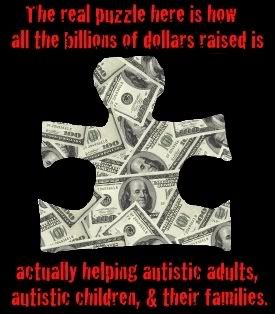





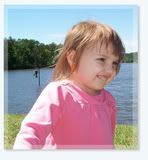

 This Way of Life
This Way of Life

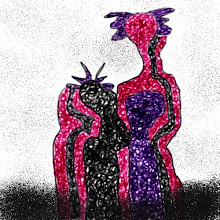

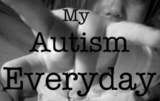





 "Autism is a way of being. It is pervasive; it colors every experience, every sensation, perception, thought, emotion, and encounter, every aspect of existence. It is not possible to separate the autism from the person."
- Jim Sinclair
"Autism is a way of being. It is pervasive; it colors every experience, every sensation, perception, thought, emotion, and encounter, every aspect of existence. It is not possible to separate the autism from the person."
- Jim Sinclair


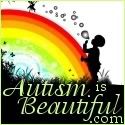




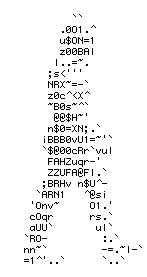

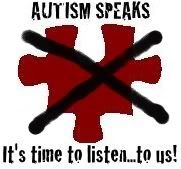












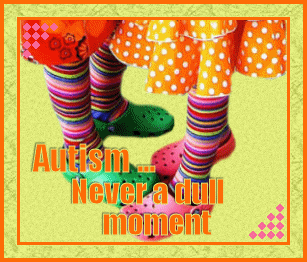

No comments:
Post a Comment